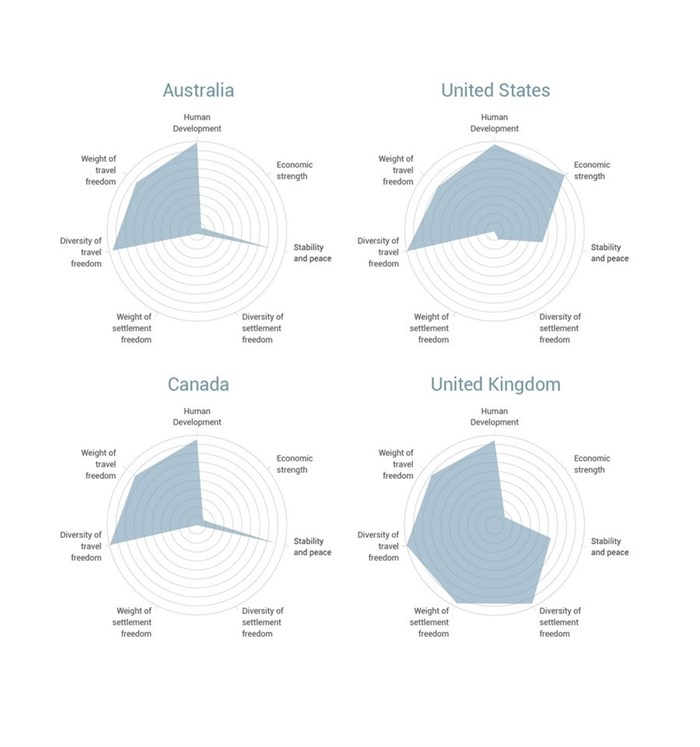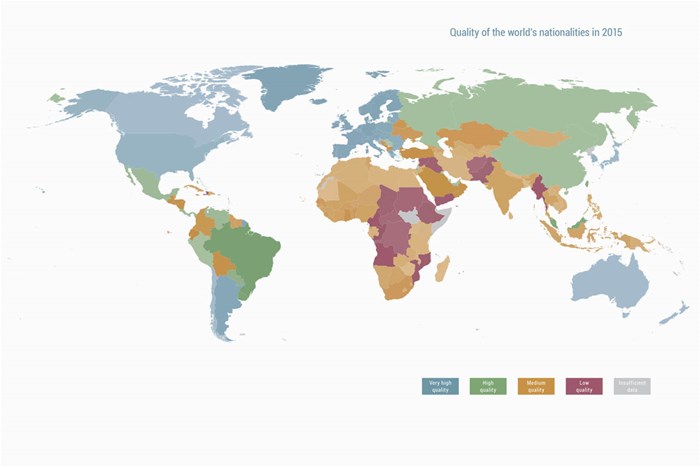
Sandra Woest
The QNI consistently ranks the German nationality the highest in the world over the last five years with a score of 83.1%. The nationality of the Democratic Republic of Congo sits at the bottom of the index on 14.3%. “South African nationality falls into the Medium Quality tier on the Index,” Sandra Woest, senior manager at Henley & Partners South Africa, says. “Although this lags behind countries in Europe, large parts of Asia, North America, and even many South American nationalities, ours is one of the stronger nationalities in Africa.” (The Index lists four tiers based on quality, from Very High to Low.)
Woest states: “It is clearly better to have a nationality of a country with long life expectancy, good schooling, and high prosperity – like Australia – than of a country which offers lower levels of security, schooling and healthcare to its nationals – like Ukraine.” Similarly, it is better to have a nationality with the rights to work and reside in several countries, like those of the European Union, with work and residence rights throughout the EU, rather than, say, Japan, which, although equally prosperous, does not offer its nationals any rights at all outside their own borders. It is also better to have a nationality of a peaceful and stable country, like Denmark, rather than of a country with security risks, like Venezuela.

QNI Graphs - Henley & Partners
What is measured and how?
To calculate the internal value of each nationality, which comprises 40% of the score, the QNI takes into account three sub-elements:
• The economic strength of the country, measured by Gross Domestic Product (GDP): 15%
• The scale of human development, as expressed by the United Nations Human Development Index (HDI): 15%
• The level of peace and stability, according to the Global Peace Index (GPI): 10%
The external value of nationality accounts for 60% of the ranking score. “The more you are restrained by national borders, the less the value of your nationality; the less noticeable the borders, the higher the value. While many opt for a life at home, an increasing number of people want to build a new life somewhere else or live their lives transnationally,” explains Woest. There are four sub-elements:
• The diversity of settlement freedom: 15%
• The weight of settlement freedom: 15%
• The diversity of travel freedom: 15%
• The weight of travel freedom: 15%.

QNI World map - Henley & Partners
Second nationality
Woest explains that The Henley & Partners – Kochenov Quality of Nationality Index, now covering the five years between 2011 and 2015, will be updated annually to ensure a current picture of the quality of world nationalities is readily available at any moment in time, illuminating medium to long-term trends in nationalities’ development.
She concludes: “The QNI is a vital resource for financially independent individuals who wish to acquire the benefits of dual citizenship, as it provides assistance in selecting the most valuable second nationality for themselves and their families.”

































